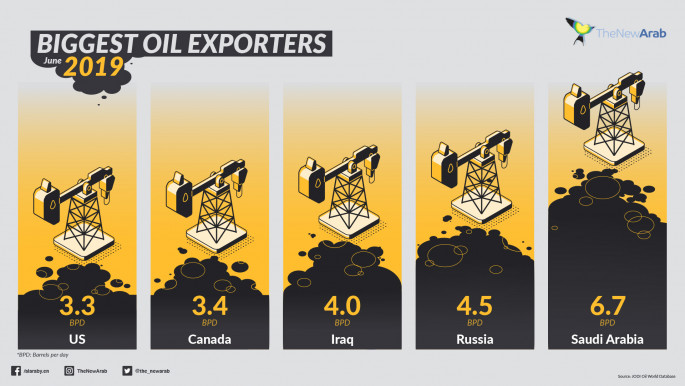Oil price war: An alternate theory on why Russia left the OPEC+ regime
A theory that has failed to gain as much traction - but that is likely closer to the truth - is that Russia and OPEC knew they needed to make additional cuts to respond to a coronavirus-triggered plunge in demand, but disagreed on how much they should be.
The OPEC+ meeting on 9 March was the first time in three years of price-stabilisation cooperation that Russia and the cartel were unable to agree on the size of cuts. When Russia vowed to produce as much as it wanted once the current OPEC+ agreement ends on 31 March, Saudi Arabia struck back by offering discounts to its main buyers in Europe and Asia, and the price of oil plummeted to $31 per barrel.
Read more: Oil slumps to lowest level since 2016
Some pundits have posited that the Russians decided to ratchet up their output to finish off the US shale industry, which lots of experts say will be unable to weather prices that drop much further.
The Russians' motive, the argument went, was revenge for US sanctions against Russia's energy industry, particularly the Nord Stream 2 gas pipeline that will supply Europe once it's completed next year.
 |
Some pundits have posited that the Russians decided to ratchet up their output to finish off the US shale industry, which lots of experts say will be unable to weather prices that drop much further |  |
The 'retaliation-against-the-US' argument fails to meet muster, however. For one thing, it presumes that Russia is no longer interested in an OPEC+ price-control mechanism. But after the Saudis began selling oil at rock-bottom prices, Russian Energy Minister Aleksander Novak said that his country remains open to price-control discussions with OPEC.
In addition, Saudi Arabia and another key OPEC member, the United Arab Emirates, have said that they, too, are open to another round of OPEC+ talks. The Russians also know that the US shale industry has rebounded from difficulty before.
When oil prices fell a few years ago to a level that would have made the shale industry unprofitable, it found cheaper ways to extract oil, keeping it in the global game.
 |
|
| Click to enlarge |
In fact, that rebound was the main reason why Moscow entered into its price-control partnership with OPEC in the first place.
Another consideration is that recent consolidation in the US shale industry means it is more resilient than ever to low prices. In 2019 alone, there were $96 billion worth of mergers and acquisitions in the sector.
Although Russia recently broke its all-time oil output record, a cloud is hanging over future production. Current output is mainly from West Siberia, where most fields have matured.
Russia needs to tap fields in East Siberia and the Arctic to prevent production from peaking in 2024. But US and European sanctions have cut off Western funding for these fields, as well as the cutting-edge technology needed to work in their difficult geologies.
The Russian government can use its $150 billion rainy-day fund to develop oil projects, of course. But a key concern will be that if prices remain low for years to come, the projects may not pay off.
The government has set a number of conditions for financing oil-development projects, and a major one is that it will commit to funding only if prices are expected to remain above $42 a barrel. Low oil prices will also hurt Russia's plans to develop its Northern Sea Route – sending oil from the Far East to Europe in tankers plying a warmer Arctic Ocean.
 |
The bottom line is that both Russia and Saudi Arabia have reasons to return to an OPEC+ price-control regime |  |
Oil prices that continue foundering pose risks for Saudi Arabia as well. Although it enjoys the world's lowest production costs, it needs a certain price to make a profit. All-out production will militate against that. An example is that Saudi Arabia experienced a record $98 billion budget deficit in 2015, when oil prices averaged $45.
Another factor that could increase Saudi Arabia's risk is how the current transition in its leadership plays out.
Read more: Could coronavirus impact oil markets?
The bottom line is that both Russia and Saudi Arabia have reasons to return to an OPEC+ price-control regime. In addition to the economic benefits they have reaped from this arrangement, the two have become closer geopolitically, which has increased the stature of both in the Middle East and beyond.
Although their current oil-output spat will test their relationship, both would be better off not contemplating a divorce.
Rauf Mammadov is resident scholar on energy policy at The Middle East Institute and senior adviser at the Gulf State Analytics. He focuses on issues of energy security, global energy industry trends, as well as energy relations between the Middle East, Central Asia and South Caucasus.
Follow him on Twitter: @RaufNMammadov



